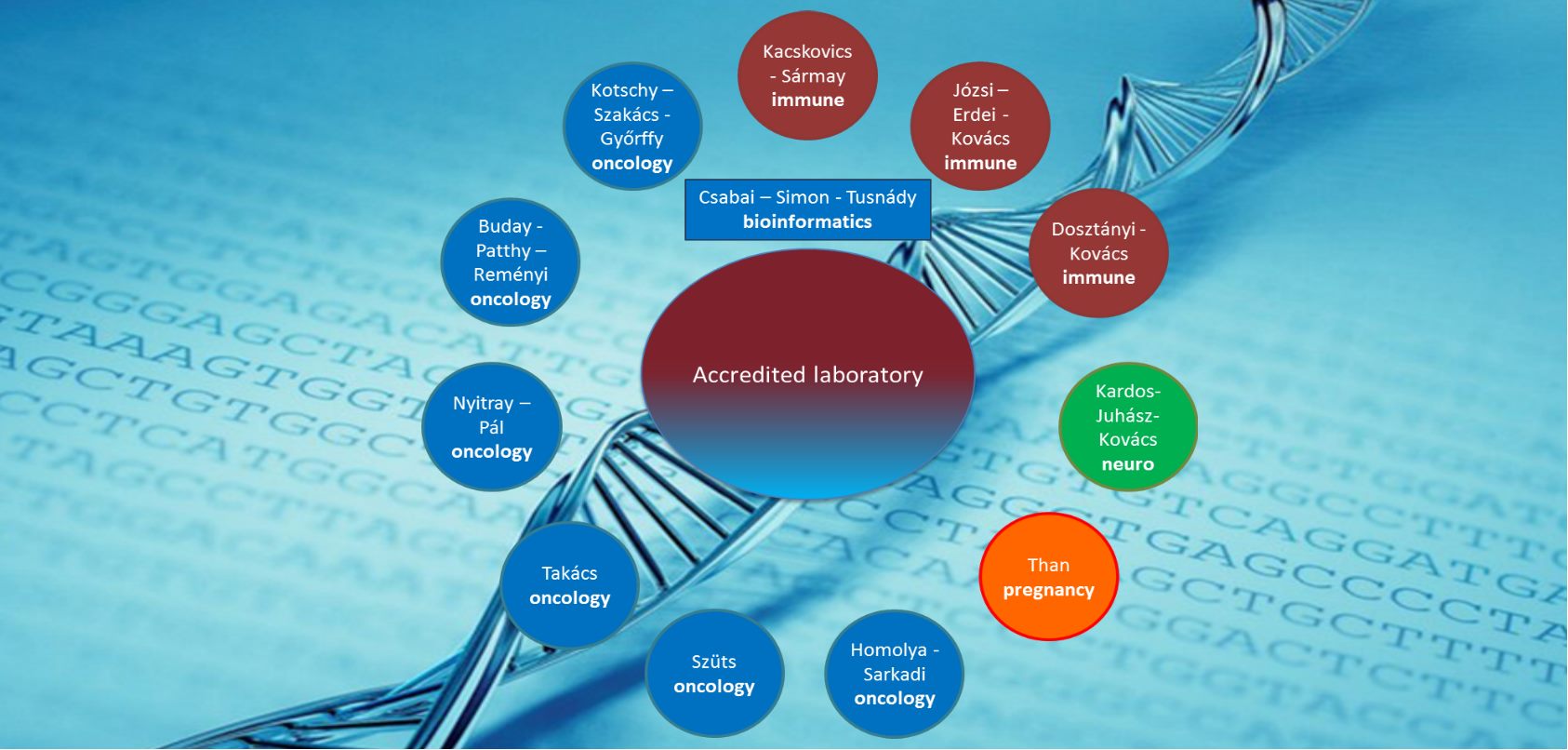
Research groups

New biomarkers for autoimmune diseases
Gabriella Sármay and Imre Kacskovics
In systemic autoimmune diseases, such as rheumatoid arthritis (RA), the body launches a continuous immune response against self tissues, thus fights against itself. Immune cells mistakenly react against the body, causing chronic inflammation. One of our objectives is to functionally analyze different B cell populations, such as plasmablasts, memory B cells and plasma cells derived from healthy donors and patients with autoimmune diseases. We will also sequence the functional antibody repertoire from such patients using high-throughput DNA sequencing technologies. One of our main focuses is to examine the effects of novel therapeutic approaches, such as monoclonal antibodies, on the B cell populations and functional antibody repertoire. We anticipate that our studies will provide next-generation biomarkers, diagnostic tools for a spectrum of diseases, including rheumatic diseases.
Read More
Differential Diagnostics in Prenatal Care
Nándor Gábor Than
Seventy percent of all pregnancies and 15% of clinically recognized pregnancies end with miscarriage, and 25% of pregnant women is destined to develop obstetrical syndromes (e.g. intrauterine growth restriction), which may have severe impact on the health of both mothers and their offspring. The main objective of our project - based on the group leader’s biomarker discovery expertise and the utilization of novel proteomics methodologies - is to develop protein biomarker-based screening methods and software tool for the use in early pregnancy, which will be suitable for the prediction of pregnancy complications in preclinical phase. These methods may also enable the differential diagnosis of various pregnancy complications and the molecular-signature based phenotyping of patients, promoting the development of personalized therapies and the rise of precision medicine in pregnancy. The group’s proprietary biomarker discovery workflow is based on international standards and may also be utilized by any protein-based biomarker research and development labs in the future.
Read More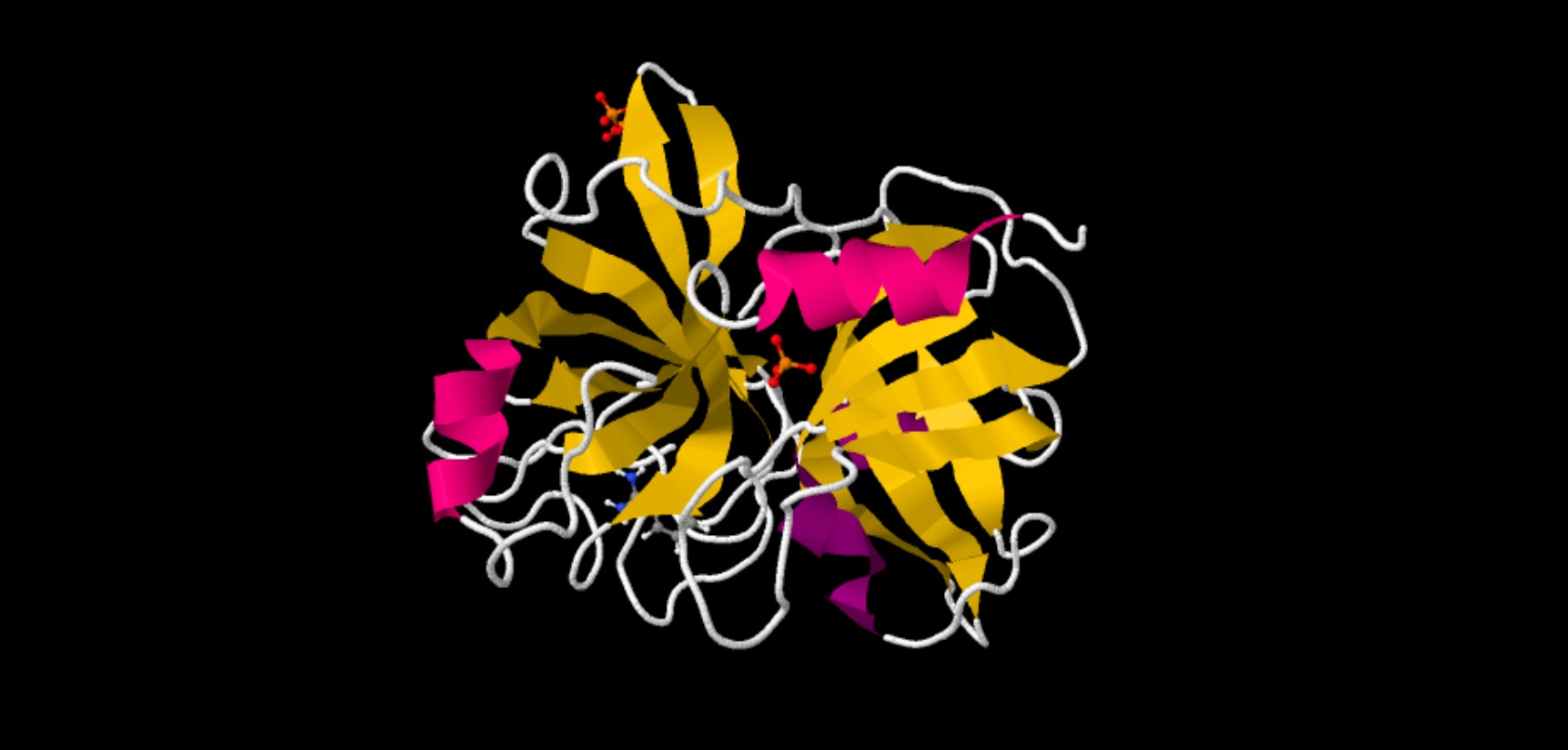
New biomarkers for COPD and lung cancer
Zsuzsanna Dosztányi
Although there have been proposals for COPD biomarkers, they do not distinguish between the various cases, like tobacco related ones and cases in non-smoking individuals. The likelihood of developing lung cancer is higher in COPD patients and there is mounting evidence that these patients are in a distinct sub-class of COPD. As cancer related biomarker research is more established than for other diseases, the experience gained related to lung cancer may help the development of COPD biomarkers for advanced diagnostic and therapeutic purposes. Based on lung cancer biomarkers and other protein decomposition products present in the blood, we will identify markers which enable clinicians to precisely categorize the sub-type of COPD and efficiently cure patients.
Read More
Bioinformatics
István Csabai
Understanding complex biomolecular phenomena requires complex models and the analysis of large experimental data sets. With the advent of the Next Generation Sequencing techniques and other high throughput instruments data seems to be more and more abundant and cheap, the bottleneck now is the framework, which can efficiently handle and analyze it. Using the latest results of computer science and machine learning we develop bioinformatics tools and services and a collaborative platform for researchers to simplify organizing and sharing their data, analysis pipelines and results.
Read More
Cancer genomics
Dávid Szüts
Personalised cancer therapy based on the molecular properties of individual tumours increases survival and life quality, and reduces side effects and treatment cost by prior elimination of ineffective therapies. The full genome sequence of tumour cells will soon be obtainable at an affordable cost. These genomes contain many tumour-specific mutations, and the pattern of mutations carries important information of the molecular properties of the tumour. To make use of this information we must understand the underlying molecular causes of tumour cell genome instability. Our main objective is to use the scientific findings to make connections between tumour mutation patterns and sensitivity to chemotherapeutic or targeted biological treatments, working towards the personalisation of cancer treatment through the analysis of tumour genomes.
Read More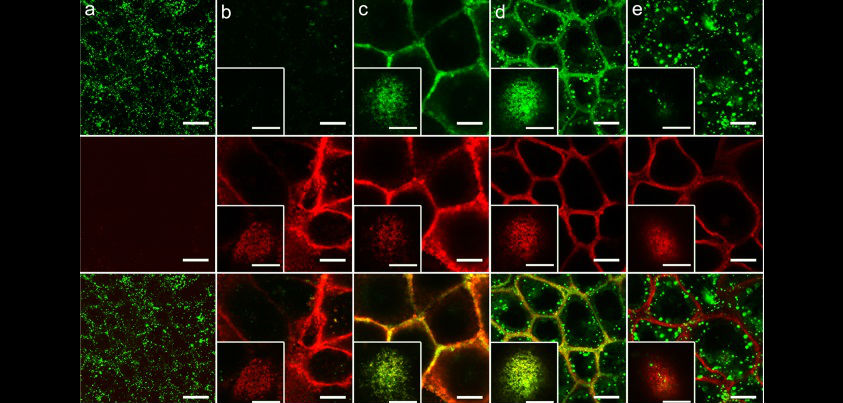
Molecular targeted therapy
Gergely Szakács
Molecular targeted therapy of solid tumors is a new standard of care - colon cancer, melanoma, renal cancer, breast cancer and many more tumors have now new precision medicine drugs at hand. However, only about 5-25% of patients are eligible for these approved therapies, 50% of which fail before the end of the first treatment cycle due to the resistance of cancer cells. Thus, new targets and new drugs must be identified to enable personalized medicine for all patients. Here, we focus on renal cell cancer and define a new molecular target enabling further stratification of patients.
Read More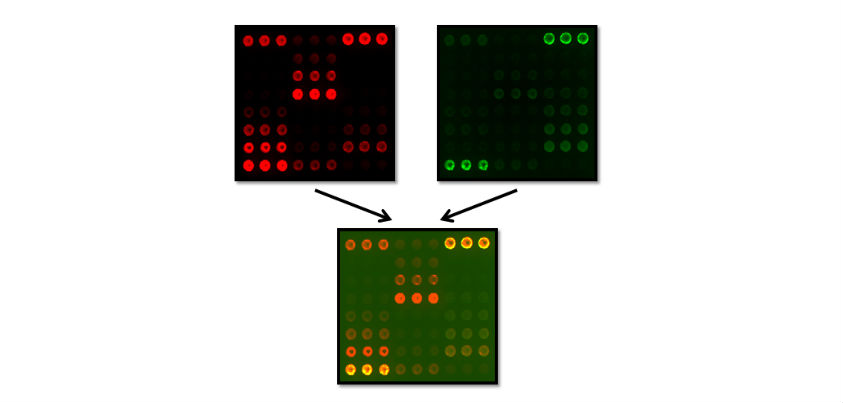
Complement biomarkers
Mihály Józsi
The complement system is an essential effector system of the humoral arm of innate immunity and plays an important role in maintaining immune homeostasis. The role of complement is recognized in an increasing number of pathological conditions, including infectious, inflammatory, autoimmune, neurological and oncological diseases. Our aim is to extract information on the state of the complement system under pathological and healthy conditions in order to identify characteristic changes or patterns. We are particularly interested in changes affecting the major complement regulator factor H and the factor H-related proteins.
Read More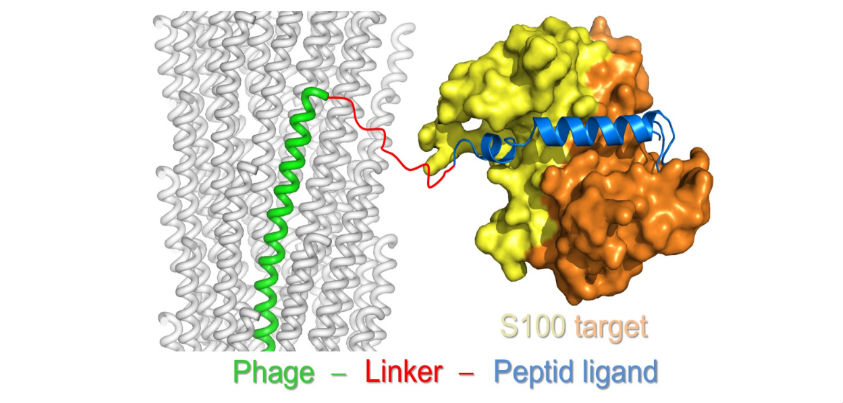
S100 protein family biomarkers
László Nyitray and Gábor Pál
Members of the Ca-binding S100 protein family are potential disease progression biomarkers in various tumors (S100B in melanomas, S100P in breast cancer, S100A4 in several metastasis-associated cancers), in chronic inflammations (S100A4 in rheumatoid arthritis) and in traumatic brain injuries (S100B e.g. in CTE). In all cases, overexpression of these small proteins (and their appearance in body fluids) is associated with the pathologies, therefore detection of the wild-type protein in blood or in CSF is a diagnostic/prognostic biomarker. It is worth noting that S100 protein-protein interactions are also promising drug targets (a few small molecule or monoclonal antibody inhibitors are already in clinical trials). Our goal is to develop alternative biomarker detection reagents for S100 proteins by directed evolution of their natural ligands. Peptides for specific S100 proteins will be evolved from known peptide ligand (previously described by us, e.g. NM2A for S100A4 and Rsk1 for S100B). These peptides providing high affinity and high selectivity alternatives for antibodies can detect the functional form of the target protein and will be used to work out an ELISA-based or ELISA-like (or e.g. SPR-based) biomarker detection assay prototype and to apply it to clinical samples provided by the FIEK consortium.
Read More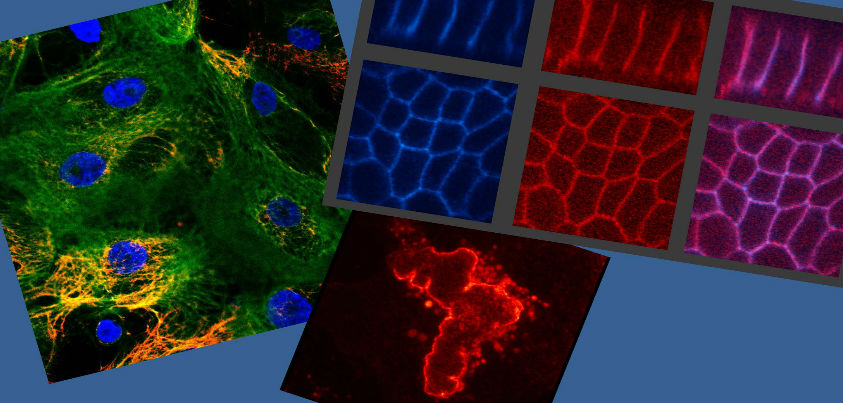
Cellular biomarkers
László Homolya and Balázs Sarkadi
Numerous biomarkers applied in clinical diagnostics or in drug development can be examined and understood only at the cellular level. Marker proteins, lipids, or sugar components in the cell membranes, e.g. the cluster of differentiation (CD) markers, membrane receptors, or transporters, have to be analyzed by cell-based methodologies. Our objective is to identify and validate new biomarkers related to membrane components relevant in various diseased conditions such as cancer, oncohematological and metabolic diseases, as well as in drug metabolism and stem cell differentiation.
Read More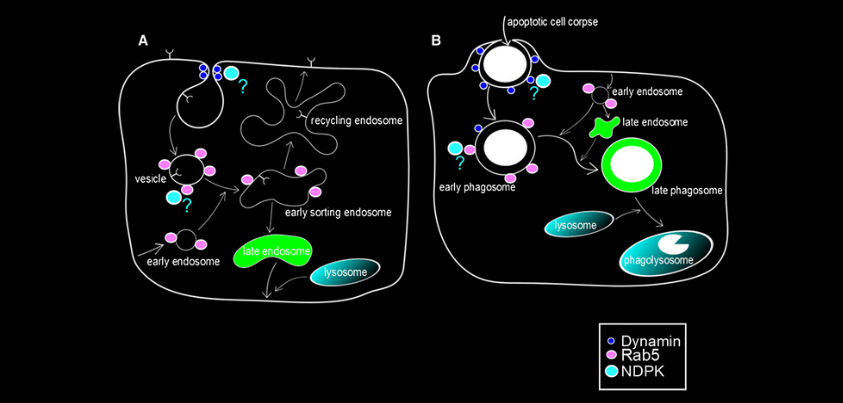
NM23 as a candidate for serum tumor marker
Krisztina Vellainé Takács
Members of the human nm23 gene family encode nucleoside- diphosphate kinases (NDPK). NM23-H1 is the best characterized NDPK amongst the ten human NM23 isoforms (H1-H10), as it was identified as the first metastasis suppressor. Despite intense investigations, the exact mechanism whereby NM23-H1 inhibits the metastatic potential of cancer cells remains elusive. Extracellular NM23 homologs, which were shown to be present in serum samples of patients suffering in certain tumor types such as breast carcinoma, neuroblastoma or hematological malignancies, are intensely investigated, and raise lots of exciting questions. The mechanism by which NM23 is secreted into the serum is unclear and also, the biological function of extracellular NM23 remains to be determined. In hematologic malignancies an elevated NM23-H1 serum level is a sign of poor prognosis. A recent study on colon cancer cell lines also identified NM23 in the secretome of tumor cells and refers NM23 as a candidate for serum tumor marker studies. Based on the above data we decided to measure the level of NM23-H1 in a series of sera from patients suffering in colorectal carcinoma (CRC). Our main question is whether increased serum NM23 protein levels are characteristic for patients with advanced stage disease (e.g. the presence of metastases).
Read More